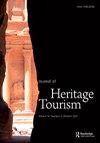不褪色:爱荷华州Clear Lake和市政部门参与黑暗旅游的案例研究
IF 2.2
Q2 HOSPITALITY, LEISURE, SPORT & TOURISM
引用次数: 0
摘要
摘要1959年,一架载有音乐家巴迪·霍利、J.P.理查森和里奇·瓦伦斯的小型飞机在爱荷华州克利尔湖附近坠毁。这场车祸将社区与摇滚乐的第一场重大悲剧永远联系在一起,并使Clear Lake成为一个黑暗的旅游目的地。Clear Lake并没有试图放弃他们悲惨的过去,而是接受了自己在这场悲剧和音乐史上的角色,将其转变为一个教育公众了解音乐遗产的机会,与坠机遇难者家属和公民合作,制定当地政策和规划,以照顾国际公众对Clear Lake悲剧关注点的兴趣。Clear Lake案例,以及那些同样接受自己作为黑暗旅游目的地角色的城市,为一个社区如何接受悲惨的过去,成为一个庆祝和教育的地方,而不是一个黑暗旅游的地方,提供了先例。本文章由计算机程序翻译,如有差异,请以英文原文为准。
Not fade away: a case study of Clear Lake, Iowa and municipal involvement in dark tourism
ABSTRACT In 1959, a small plane carrying musicians Buddy Holly, J.P. ‘The Big Bopper’ Richardson, and Ritchie Valens crashed in a field near Clear Lake, Iowa. The crash forever linked the community with rock-n-roll’s first major tragedy and established Clear Lake as a dark tourism destination. Rather than trying to back away from their tragic past, Clear Lake has embraced its role in this tragedy and in music history, turning it into an opportunity to educate the public about musical heritage, working with families of the crash victims, the citizens, and working local policy and planning to accommodate the international public interest in Clear Lake’s tragic points of interest. The Clear Lake case, and cities who have similarly embraced their role as a dark tourism destination, provide precedent into how a community can embrace a tragic past to become not a place of dark tourism, but a place of celebration and education.
求助全文
通过发布文献求助,成功后即可免费获取论文全文。
去求助
来源期刊

Journal of Heritage Tourism
HOSPITALITY, LEISURE, SPORT & TOURISM-
CiteScore
6.50
自引率
11.10%
发文量
39
期刊介绍:
The Journal of Heritage Tourism ( JHT ) is a peer-reviewed, international transdisciplinary journal. JHT focuses on exploring the many facets of one of the most notable and widespread types of tourism. Heritage tourism is among the very oldest forms of travel. Activities such as visits to sites of historical importance, including built environments and urban areas, rural and agricultural landscapes, natural regions, locations where historic events occurred and places where interesting and significant living cultures dominate are all forms of heritage tourism. As such, this form of tourism dominates the industry in many parts of the world and involves millions of people. During the past 20 years, the study of tourism has become highly fragmented and specialised into various theme areas, or concentrations. Within this context, heritage tourism is one of the most commonly investigated forms of tourism, and hundreds of scholars and industry workers are involved in researching its dynamics and concepts. This academic attention has resulted in the publication of hundreds of refereed articles in various scholarly media, yet, until now there has been no journal devoted specifically to heritage tourism; Journal of Heritage Tourism was launched to fill this gap. JHT seeks to critically examine all aspects of heritage tourism. Some of the topics to be explored within the context of heritage tourism will include colonial heritage, commodification, interpretation, urban renewal, religious tourism, genealogy, patriotism, nostalgia, folklore, power, funding, contested heritage, historic sites, identity, industrial heritage, marketing, conservation, ethnicity, education and indigenous heritage.
 求助内容:
求助内容: 应助结果提醒方式:
应助结果提醒方式:


